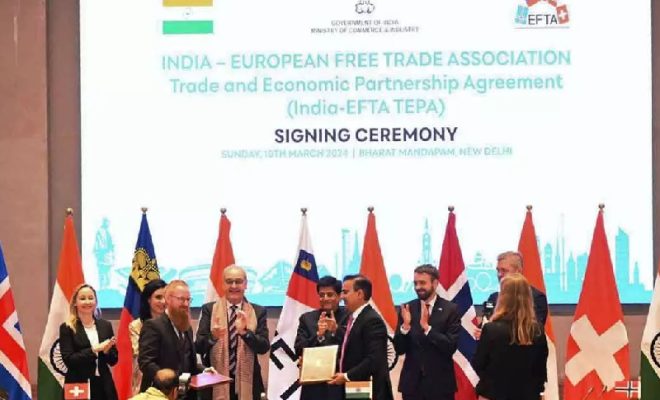India and 4 European nations inks $100bn trade pact

The negotiations between India and the European Free Trade Association (EFTA) have been an arduous process spanning nearly 16 years. This landmark agreement didn’t come easy; it required extensive discussions, compromises, and fine-tuning of terms to ensure it was mutually beneficial. Both parties invested significant time and resources into deliberating over various aspects of trade and investment, aiming to strike a balance between protecting domestic industries and opening up opportunities for economic growth.
Terms of the Deal
Under the terms of the agreement, India has made a commitment to lift most import tariffs on industrial goods originating from the four EFTA member countries—Norway, Switzerland, Iceland, and Liechtenstein. In exchange, these EFTA nations have pledged to invest a substantial amount, totaling $100 billion, in India over the course of 15 years. This reciprocal arrangement aims to foster economic development and deepen bilateral trade relations between India and the EFTA countries. By reducing trade barriers and encouraging investment flows, the agreement seeks to create a more conducive environment for businesses to thrive and expand their operations across borders.
Expected Impact on Industries
The infusion of investments from the EFTA countries is poised to have a transformative impact on various sectors within India. Industries such as pharmaceuticals, machinery, and manufacturing are expected to benefit significantly from this influx of capital. The investments will not only bolster infrastructure and technology upgrades but also stimulate job creation and skill development. Furthermore, the agreement is anticipated to streamline customs procedures and enhance market access, making it easier for businesses from both India and EFTA nations to navigate regulatory complexities and seize growth opportunities. This alignment of economic interests is a testament to the potential for mutually reinforcing partnerships in the global marketplace.
Also Read : Pakistani Students Face Death Sentences Over WhatsApp Messages
Political Considerations and Ratification Process
Despite the substantive progress made in negotiating the agreement, the journey towards its implementation is far from over. The next crucial step involves securing ratification from India and the four EFTA member states. Switzerland has outlined plans to complete this process by the following year, signaling a commitment to advancing the agreement’s agenda. However, the political landscape in India adds a layer of complexity to the timeline, particularly with general elections on the horizon and Prime Minister Narendra Modi seeking a third term. The interplay of domestic politics and international trade dynamics underscores the delicate balance between economic imperatives and political exigencies.
The agreement between India and the EFTA represents a significant milestone in advancing economic cooperation and integration on a global scale. By forging deeper ties and promoting trade liberalization, both sides stand to reap the benefits of enhanced market access, increased investment flows, and sustainable growth. As the ratification process unfolds and the agreement takes effect, stakeholders must remain vigilant and proactive in addressing any challenges that may arise, ensuring that the promise of prosperity and mutual benefit is realized for all parties involved.



